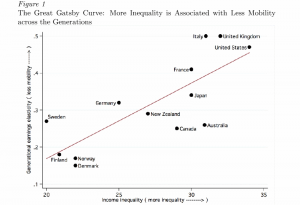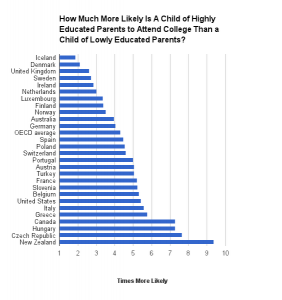Today is Budget Day eve, an appropriate time to be thinking about what the morrow might bring when it comes to policies and solutions. So, following last week’s column on why centre-right voters might be concerned about inequality, here are some policies that a centre-right government could implement. I don’t necessarily expect to see anything of the sort; in fact, in the last 24 hours, it’s become unclear whether we will even see any progress on child poverty, the one area the government has specifically promised to address. But that’s not to say that there aren’t things National could do to address income imbalances.
In fact, there are plenty of things that centre-right governments can do, and have done in the past, to reduce inequality, bearing in mind that income gaps fell right across Keith Holyoake’s long tenure as prime minister from 1960 to 1972. Many of the long-term investments in health and education are well understood and fairly obvious, so I won’t discuss them here, although it is worth noting that with the long-term cost of child poverty estimated at $6 billion-8 billion, a little bit more early investment would make good sense on economic grounds alone. But what else is there on the table?
For a centre-right government, most of the traditional anti-inequality warhorses from the tax and benefits stable are of little interest. But not all of them. Across the spectrum, there is a good argument for taxing all forms of income equally (the Treasury certainly thinks so), and last week’s announcement of a very limited capital gains tax could easily be turned into the real thing. That would reduce inequality at the top end, but also help channel investment away from real estate and into more productive things.
Also on the tax-benefits issue, a number of people, including the Prime Minister and his biographer, John Roughan, have noted that while pensions rise in line with wages, other benefits rise only in line with inflation, and are thus falling further and further behind the average wage. If, like Adam Smith, you think that what people need to escape poverty is set by society’s average standard of living (the things, in his words, that society has deemed that “credible” people cannot be without), there is a good argument for indexing benefits to the average wage. And that’s no small matter. If that had been done since the early 1990s, the standard unemployment benefit would be 15% higher than it is now – helping lift tens of thousands of people and their children out of poverty.
Perhaps counterintuitively, the universal basic income (UBI), an unconditional cash grants to every adult every year, isn’t out of bounds either. Milton Friedman was a big fan, on the basis that a small measure of security would give people a stable base for being more entrepreneurial. And in New Zealand, one of the UBI’s biggest advocates is Gareth Morgan, no one’s idea of a firebrand left-winger. Though not without its flaws as an idea, the UBI is worth taking seriously.
But as I said, tax and benefits aren’t the main thing for the centre-right. Jobs are much more important, and the government is clearly making an effort in that regard. But certain areas remain woefully neglected – training in particular. Yes, there are more apprenticeships, and some other reforms underway, but other countries still invest vastly more than we do. Think about Denmark’s fabled flexi-curity model: it makes it quite easy to fire workers (the ‘flexi’ part), but then invests billions of euros in retraining them if their industries have disappeared or their skills have become obsolete(the ‘security’). It’s an acknowledgement that while people should seek work, you can’t always expect them to get there on their own.
And it is in the world of work that centre-right arguments about inequality can really come into their own. After all, it is a well-established conservative principle that reward should be linked to effort and talent. But we know in New Zealand that although the economy has grown significantly in the last 20 or so years, the average wage has fallen well behind: if it had kept pace with growth, it would be about $10 higher than it is. That’s a lot. One way to restore ordinary staff’s share of growth would be through stronger trade unions, but that’s clearly a nonstarter in this context. So what else?
Well, there’s an argument that too much of company income goes to the chief executives and senior managers. There’s certainly a mountain of international evidence showing that big income gaps within a company are extremely demotivating for ordinary staff. If they don’t feel like pay rates within their company are fair, they switch off. In contrast, when staff feel they are being paid fairly, they are more likely to internalise the company’s goals and work harder. Companies with highly engaged staff are, the evidence shows, far more profitable than others. And the evidence is that higher CEO salaries in New Zealand can’t be explained by increased levels of performance. So a centre-right government could apply at least some gentle pressure on top-level salaries (maybe starting with some of our extraordinarily well-paid government chief executives). If both CEO and senior manager salaries were a bit closer to what they should be based on effort and contribution, you might have a bit more to share around amongst ordinary staff.
More appealingly, perhaps, a centre-right government might think about company ownership. As the American writer Jeff Gates once noted, the strange thing about capitalism is that it creates so few capitalists: very seldom do people have any meaningful stake in the company where they work. So the government could do a thing or two to encourage employee share-ownership – tax incentives for companies that give all staff share options, for example. That would tackle wealth inequality and income inequality (given the income that those shares would generate), as well as boosting staff’s sense of being part of the company and therefore their motivation.
In short, there are plenty of things that National could do to address inequality. As to whether it will or not … well, we’ll just have to wait for tomorrow.


